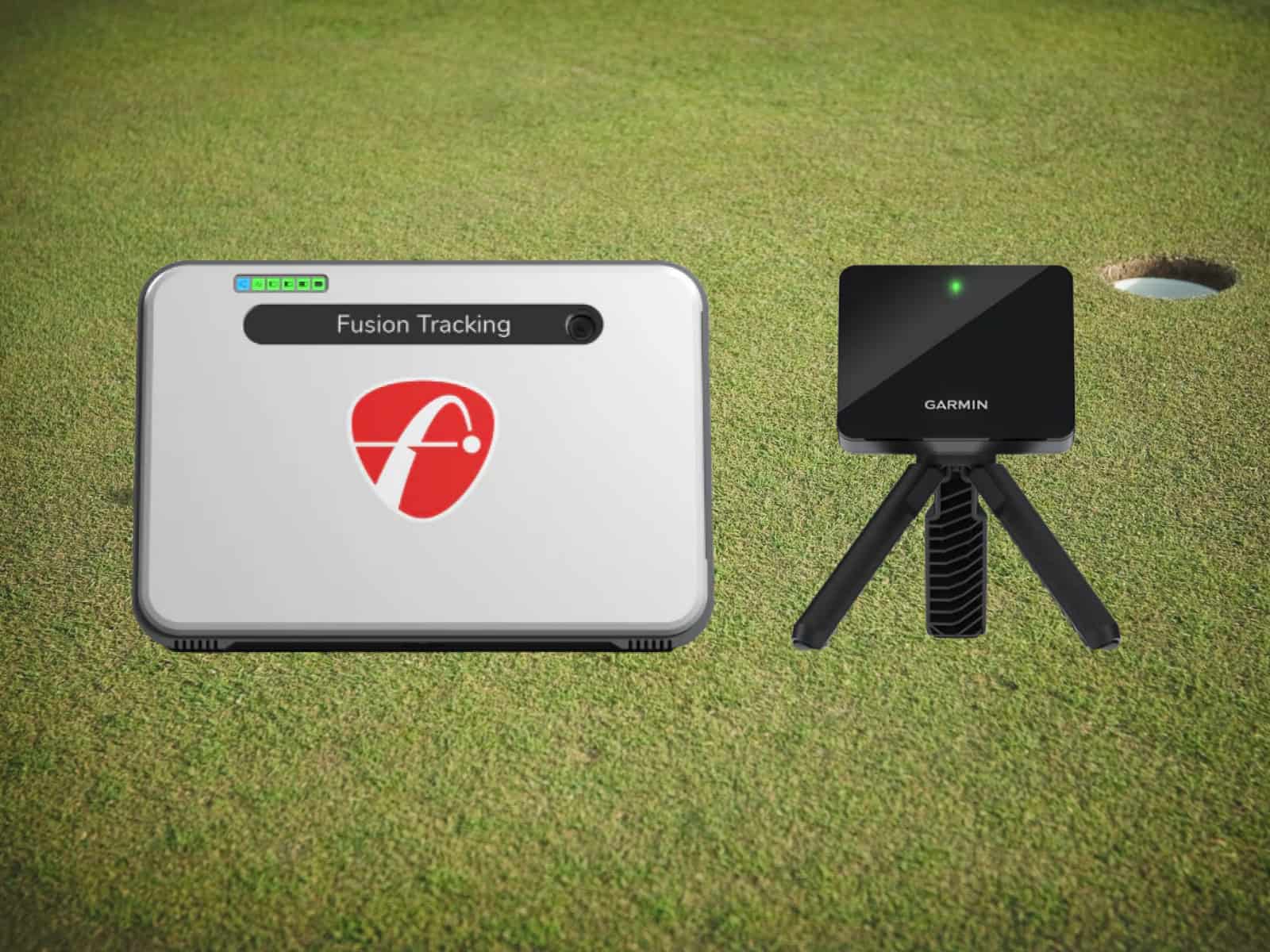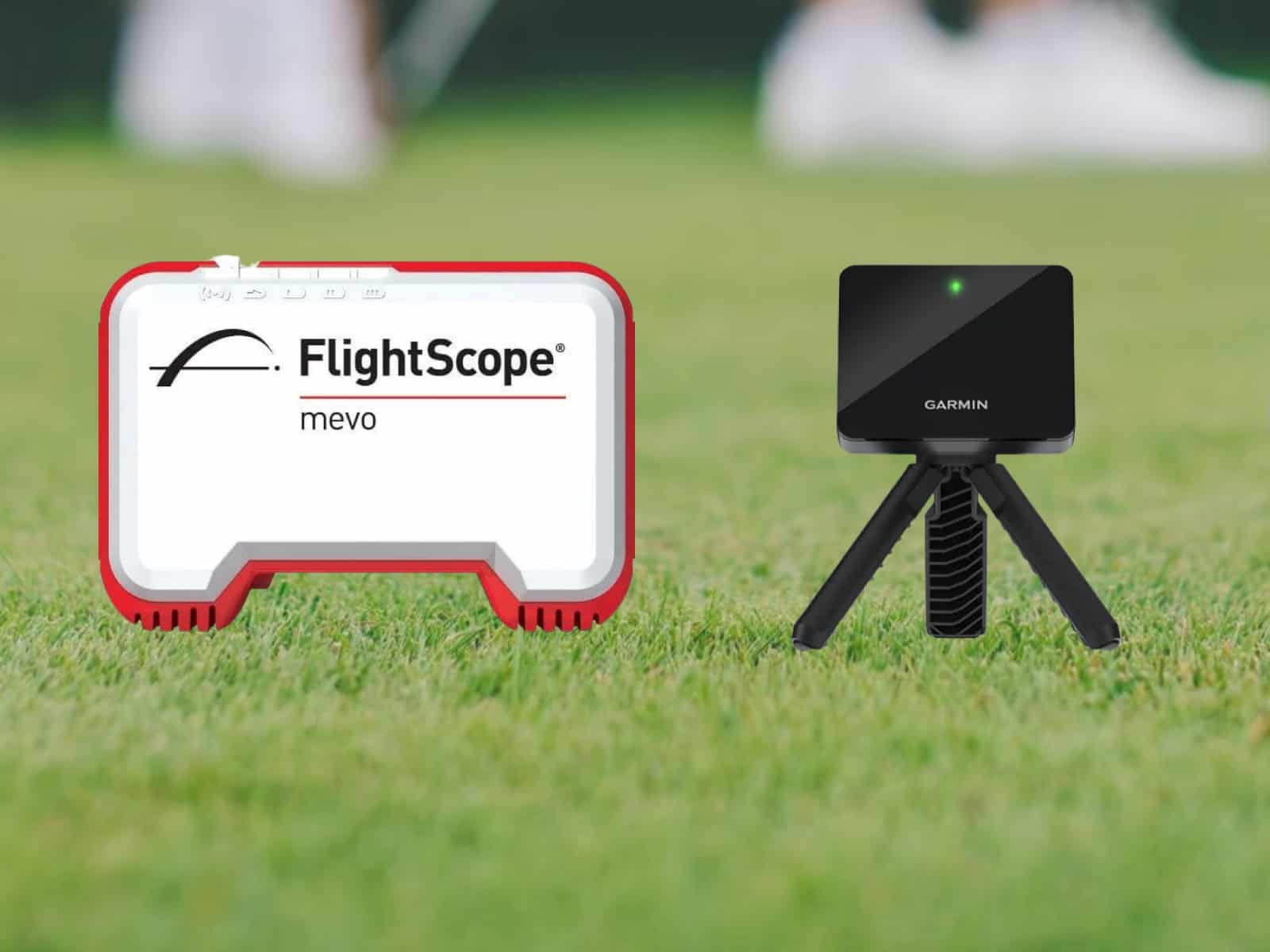HD Golf and TrackMan are status symbols in the world of serious indoor golf. Whether you’re chasing scratch or just want to practice without braving the elements, these two giants lead the pack. But they couldn’t be more different in how they get the job done.
If you’ve ever found yourself stuck between TrackMan’s data-rich tech and HD Golf’s jaw-dropping visuals, you’re not alone. One promises clinical precision; the other feels like stepping into Augusta. Choosing the right one isn’t just about price—it’s about fit.
This detailed guide breaks down what matters: accuracy, gameplay, coaching tools, usability, and value. You’ll know exactly which system deserves a place in your setup—and which one doesn’t.
HD Golf vs. TrackMan: Quick Comparison Table
Here is a detailed chart comparing the two systems’ features and technologies:
| Feature | HD Golf | TrackMan |
|---|---|---|
| Technology | High-speed camera-based tracking | Dual radar + high-speed camera |
| Accuracy Focus | Visual realism with solid data | Tour-level precision and metrics |
| Space Requirements | Moderate to large | Large (radar needs more room) |
| Graphics Quality | Photorealistic real-world courses | Clean, but data-focused visuals |
| Software Interface | Intuitive and user-friendly | Data-driven, pro-grade dashboards |
| Playable Courses | 40+ premium scanned real courses | 300+ with dynamic updates |
| Best For | Entertainment + Serious training | Serious training + pro-level analysis |
| Typical Price Range | $40K–$70K+ | $25K–$50K+ (plus extras) |
| Subscription Fees | Lower ongoing costs | Higher for full features |
| Setup Complexity | Plug-and-play-friendly (Professional setup offered) | Requires expert calibration |
You want HD Golf if your priority is stunning visuals, ease of use and entertainment value. It turns your basement into Pebble Beach without blinking.
You want TrackMan if you’re chasing technical perfection. It doesn’t care how pretty it looks—it cares how perfect your swing is.
Tracking Accuracy and Performance Breakdown
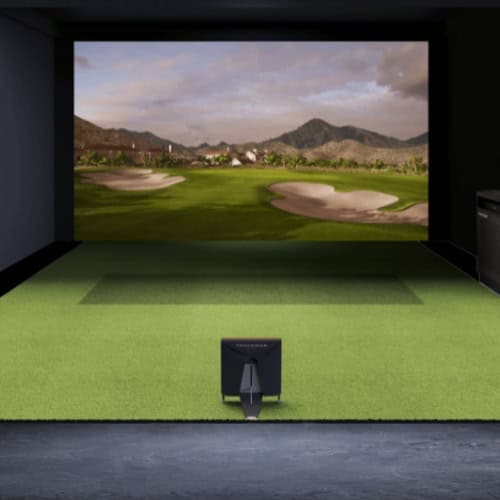
When it comes to golf simulators, data is either your best friend or your biggest letdown. Here’s where HD Golf and TrackMan show their true colors—under the hood and in the numbers.
Ball Flight and Club Data Precision
Numbers don’t lie—especially when you’re trying to fix a slice. TrackMan leads the charge here. Its dual radar system measures over 40 data points: ball speed, club path, launch angle, spin rate, smash factor—you name it. Every swing gets dissected.
HD Golf, on the other hand, focuses on combining solid accuracy with visually rich feedback. It uses multiple high-speed cameras to track ball and club metrics. The data’s good—very good—but not quite as exhaustive as TrackMan’s.
If you’re coaching, competing or obsessed with your stats, that edge matters.
Tracking Technology: Camera-Based vs. Radar-Based Systems
TrackMan’s radar thrives in wide, open spaces. It tracks the ball’s full flight—even after it hits the screen. That means true carry distance and real-time physics. But you’ll need a larger room.
HD Golf leans on ceiling-mounted cameras. This setup works in more confined spaces and still captures impressive shot data. It may not trace the ball through the air, but it models its path with surprising realism.
Environmental Sensitivity and Indoor Performance
Lighting. Space. Ceiling height. These things make or break a simulator.
TrackMan needs clear sight lines and controlled light to perform at its best. It can get twitchy if conditions aren’t right. HD Golf is more forgiving—it’s built to run in commercial environments, so it adapts better to indoor quirks.
Real-World Validation and Use by Professionals
There’s a reason you see TrackMan on Tour ranges. It’s trusted by the best. Dustin Johnson, Rory, Countless instructors swear by it because it’s brutally honest.
HD Golf shows up more in entertainment venues, academies and high-end homes. It’s great for coaching—but also designed to impress.
That leaves one big question: what’s more important to you—raw data, or immersive experience? Because here’s where the paths start to split…
Simulation Realism and Gameplay Experience
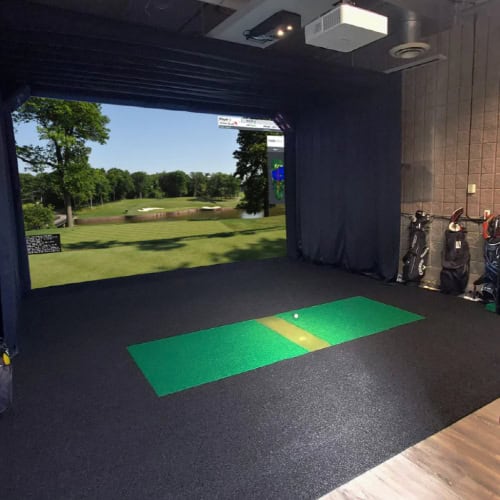
HD Golf delivers eye candy. Its courses are photo-scanned using proprietary image processing, so you’re not just seeing a hole—you’re standing in it. Trees sway, shadows shift and fairways feel alive. If visual realism makes or breaks your experience, HD Golf checks every box.
TrackMan? It’s functional. Clean, crisp, but designed for data first. The visuals aren’t bad, but they’re utilitarian. It’s like comparing a high-end driving range to a scenic round at Pebble Beach.
Practice Modes and Shot Feedback
This is where things get serious. Both systems provide shot feedback, but in very different ways.
HD Golf leans into the experience. Hit a draw, and the ball arcs gracefully with visual confirmation. Launch angles, side spin, clubface data—it’s all there, but presented with more flair.
TrackMan hits you with numbers. Every shot is a data dump. Carry, roll, apex height, attack angle—all tracked and ready to be analyzed. If you’re training with purpose, it’s gold.
Multi-Player and Tournament Functionality
HD Golf shines here. Multiple players can jump in, play alternate shot, stroke play or closest-to-the-pin games. It is great for family nights or a guy’s weekend.
TrackMan isn’t just for solo grinders, though. It offers virtual tournaments, peer-to-peer play and leaderboard integration. But it’s less social simulator, more online training arena.
Setup and User Experience
TrackMan demands room. At least 16 feet of depth, sometimes more. That’s because radar needs space to track the ball properly. High ceilings help, too. It’s not ideal for basements or tight garages.
HD Golf is more forgiving. The camera-based system lives above or around the hitting area. It works in smaller rooms with lower ceilings. Less setup stress, fewer space constraints. However, the simulator comes with a huge enclosure that requires around 20′ of depth.
You’d expect TrackMan’s software to feel like a control center—and it does. Lots of numbers, toggles, overlays. It’s made for instructors and data junkies. But it can overwhelm casual users.
HD Golf is more plug-and-play. You power it on, pick a course and go. Menus are cleaner, and navigation is intuitive, causing less friction between you and your next shot.
App Support and Remote Access
TrackMan’s app ecosystem is robust—TrackMan Golf, Performance Studio, MyTrackMan. You can review data, analyze swings and even track performance over time.
HD Golf’s remote features are more limited. Some functions can be controlled via touchscreen or tablet, but the experience stays mostly local. Still, how often are you really going to dive into swing charts on your phone at dinner?
Training and Coaching Capabilities

TrackMan is a beast when it comes to raw data. Every shot gets logged, broken down and dissected with pinpoint detail. You’ll know your swing path, face angle, dynamic loft, and even your angle of attack. It’s like hooking your swing up to a polygraph—no hiding.
HD Golf also tracks vital swing data with exceptional accuracy, but it serves it up in a more digestible way. It’s built more for player-friendly insights than deep-dive analytics. Think more big-picture than micro-adjustments.
Video Playback and Coaching Integrations
TrackMan integrates seamlessly with high-speed video. You get slow-motion replays synced with your swing metrics. It’s used by top coaches for a reason—it shows, tells and proves all in one go.
HD Golf includes integrated video replay, too. Its system auto-records every swing and overlays club and ball data. No setup, no syncing—just instant feedback. It’s simple and surprisingly effective.
Preferred Tool for Instructors and Academies
TrackMan dominates at the top-tier coaching level. College programs, PGA pros, tour coaches—they all use it because it’s ruthless with feedback. If you’re looking for game improvement backed by science, TrackMan fits.
HD Golf sees more love in commercial teaching studios and indoor academies. It balances teaching tools with a smoother user experience for students. Coaches like how fast they can run sessions without babysitting the tech.
The question is—do you want a lab, or a classroom? Because that answer will swing your decision.
Software and Course Library
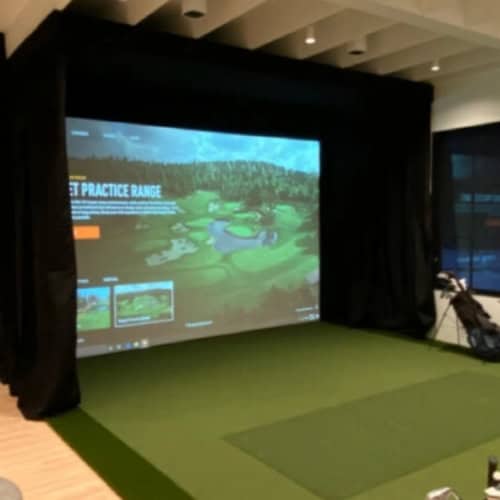
HD Golf takes pride in realism. Each course is photo-scanned from actual locations. You get access to over 40 world-famous courses like Pebble Beach, St Andrews and Bethpage Black. Every tree, bunker, and skyline looks like the real thing.
TrackMan doesn’t focus on photorealism. Instead, it boasts a massive course library—more than 300 and growing. The graphics are clean and functional, but the magic is in the playability. TrackMan courses offer a realistic golfing experience, with fairways that roll true and greens that react with precision. It’s about feel, not flash.
Licensing, Updates and Custom Course Features
HD Golf offers lifetime course ownership. You buy it, you own it. Updates are available, but it’s not subscription-heavy. What you see is what you keep.
TrackMan uses a subscription model. You pay for access to full course libraries, software updates and advanced features. The upside? Constant improvements. The downside? Recurring fees.
If you want a custom course built from your home club, HD Golf can do that—for a price. TrackMan, however, doesn’t offer this service.
Online Play and Competitive Modes
TrackMan is built for connection. Join weekly global tournaments. Challenge friends across continents. Climb the leaderboard. It’s a digital clubhouse with real stakes.
HD Golf includes local multiplayer and private tournaments, but it’s more contained. Less focus on global play, more on in-room experience. Still fun, just not as connected.
Cost of Ownership
HD Golf starts at $40K–$70K with a premium, all-in-one setup—mats, screens and sensors included. It’s plug-and-play with minimal ongoing costs and lifetime course ownership.
TrackMan starts around $25K but can climb fast with add-ons. It’s modular and flexible but requires extra gear—PC, projector, mat, etc.—plus a $1K–$2K annual subscription for full features.
In short, HD Golf costs a higher upfront, lower long-term cost, while TrackMan offers a lower entry, but a higher ongoing investment.
Best Use Scenarios for Each Simulator

Both HD Golf and TrackMan can handle almost anything you throw at them—but they shine in very different settings. Matching the tool to the job makes all the difference.
Home Users
HD Golf is tailor-made for home environments. It comes as a full package, and looks beautiful in a finished basement or man cave. The system’s ease of use and stunning visuals make it family-friendly without sacrificing swing feedback.
TrackMan can work at home, but only if you’ve got the space—and the patience. It demands a long room, careful setup and more involvement. It’s a serious tool for serious players.
Coaching and Training Facilities
TrackMan owns this lane. Coaches rely on its detailed feedback and coaching tools. Pair it with video replay, lesson tracking and student performance history, and you’ve got the gold standard. It’s what you’ll find in tour vans and top-tier academies.
HD Golf works very well here too. It gets students engaged quickly and simplifies feedback. You’ll sacrifice some of the ultra-fine data points, but you’ll gain a more comfortable, streamlined experience.
Commercial Simulator Venues
HD Golf wins the crowd here. Entertainment venues, country clubs, and golf bars love its immersive visuals, multiplayer modes and wide appeal. It’s plug-and-play, requires less babysitting and delivers high-quality fun for players of any skill level.
TrackMan, while capable, is more of a specialist’s machine. It’s not designed for quick-turn gameplay or casual golfers. It shines with focused use, not beers and birdies with buddies.
If you’re leaning toward HD Golf and want a deeper dive into its features, setup experience, and real-world performance, be sure to check out our in-depth HD Golf Simulator review. It covers everything from installation tips to gameplay impressions and whether it’s worth the investment for your space.
Touring Professionals
This one’s not even close. TrackMan is the go-to. Trusted by tour players, coaches and club fitters, it offers the exact data needed to prep for tournament play. It travels well, works on the range and has proven itself on the biggest stages.
HD Golf wasn’t built with tour pros in mind. It’s a strong simulator—but not a tour-level launch monitor.
Pros and Cons Summary Table
We’ve put the advantages and drawbacks of each system in simple charts that are easier to understand to help you have a better idea which one is perfect for your needs:
| Feature Category | HD Golf – Pros | HD Golf – Cons |
|---|---|---|
| Visual Experience | Stunning photo-realistic course graphics | Graphics focus may limit ultra-precise data (but accuracy is still exceptional) |
| Ease of Use | Professional setup included in price, and user-friendly interface | Less customizable hardware and tech options |
| Multiplayer Play | Fun, intuitive, ideal for social play | Limited online competition and leaderboard play |
| Space Requirements | The ceiling-mounted cameras don’t require too much room length, but the enclosure does | Requires dedicated area for full enclosure and more length for tracking accuracy |
| Upfront Value | Bundled hardware minimizes build complexity | Higher starting cost compared to basic setups |
| Training Features | Solid swing data with automatic video replay | Relatively fewer data points for advanced swing tuning |
| Ongoing Costs | Minimal subscriptions; own your courses | Updates and new content cost extra |
| Feature Category | TrackMan – Pros | TrackMan – Cons |
|---|---|---|
| Data Precision | Tour-level metrics, unmatched detail | Can overwhelm casual users |
| Coaching & Training | Trusted by pros and top instructors | Steeper learning curve for beginners |
| Flexibility | Modular hardware; use indoors or outdoors | Requires more space to function properly |
| Course Library | 300+ courses, frequently updated | Lacks the visual realism of photo-scanned maps |
| Online Play | Global tournaments, peer matchups | Dependent on subscription tiers |
| App Ecosystem | Robust mobile tools and data access | Full functionality tied to annual fees |
| Initial Cost | The total cost rises quickly with full setup | Total cost rises quickly with full setup |
Where to buy?
The following are our recommended online retailers to get your HD Golf or Trackman system from:
For HD Golf – We recommend the Official HD Golf website or the Indoor Golf Shop, which offers both the Ultimate Entertainment Package and the Ultimate Training Package.
As for Trackman – We also recommend buying from the official Trackman website, especially if you want to get Trackman 4. If you want the Indoor Optimized Trackman IO, we suggest getting full packages from renowned resellers like the following:
Frequently Asked Questions
Our team has compiled a list of common questions about the two outstanding systems to help you know which one best suits your needs and preferences.
Which simulator is better for professional training?
TrackMan, no hesitation. Its radar-based tracking, detailed swing metrics and trusted status on Tour make it the clear pick for serious game development. Coaches love it and pros rely on it.
HD Golf holds its own very well for general improvement, but it’s built more for experience than elite calibration.
Can either system work in compact spaces?
Both systems require a very large room to function properly; however, HD Golf is camera-based, ceiling-mounted and needs less depth to accurately track your shots.
What’s the learning curve for new users?
HD Golf is relatively easier to just turn on and play. Menus are simple and feedback is visual. It’s more beginner-friendly and family-safe.
TrackMan takes some getting used to. The interface is dense, the numbers come fast and setup can be technical. Once you master it, it’s brilliant—but it doesn’t hold your hand.
Which offers better value for commercial setups?
HD Golf is the safer bet for businesses—sim bars, clubs, retail spaces. It’s turnkey, durable and entertaining for all skill levels. TrackMan is better for high-end academies or training-first facilities. If you’re selling lessons, data and improvement, the investment pays off.
Do they offer online competition and updates?
Both systems offer a solid online experience. Still, TrackMan leads the pack with global tournaments, online match play and regular course updates. You’ll never run out of content—or competition.
HD Golf offers excellent multiplayer modes, but the online element isn’t its core strength. It’s more about the in-room vibe than global bragging rights.
Final Thoughts
HD Golf gives you polished visuals, straightforward gameplay and low-hassle setup. It’s easy to run, fun to play and looks like golf should feel. If you’re building a home setup, entertaining guests or want coaching tools without the learning curve—it nails it.
TrackMan doesn’t try to impress with scenery. It impresses with cold, clinical truth. It’s the launch monitor tour players swear by. If your goal is to measure, track and tweak every swing detail to perfection, there’s no substitute.
Both systems are powerful—but in very different ways. One pulls you into the game; the other breaks it down to the decimal.
So the choice isn’t just about budget—it’s about what kind of player you are… and what kind you’re trying to become.
Thanks for reading!




